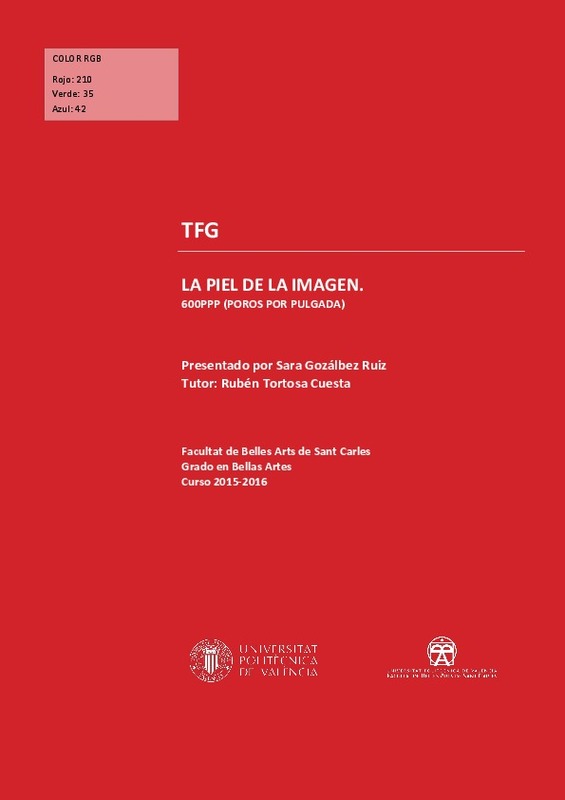JavaScript is disabled for your browser. Some features of this site may not work without it.
Buscar en RiuNet
Listar
Mi cuenta
Estadísticas
Ayuda RiuNet
Admin. UPV
LA PIEL DE LA IMAGEN. 600ppp (poros por pulgada)
Mostrar el registro sencillo del ítem
Ficheros en el ítem
| dc.contributor.advisor | Tortosa Cuesta, Rubén
|
es_ES |
| dc.contributor.author | Gozálbez Ruiz, Sara
|
es_ES |
| dc.date.accessioned | 2016-11-09T10:55:55Z | |
| dc.date.available | 2016-11-09T10:55:55Z | |
| dc.date.created | 2016-07-14 | |
| dc.date.issued | 2016-11-09 | es_ES |
| dc.identifier.uri | http://hdl.handle.net/10251/73645 | |
| dc.description.abstract | [EN] The issue that addresses the present project aims to deep in an introspective way on identity through the use of the own body. Work is divided into two basic parts: the registration of the body and of space - time, as a daily graph using a scanner; the time is waiting in order to observe it. This process of self - consciousness as part of a constant search speaks of transformation of the subject to assume his image, screen exposure involves a kind of mirror that registers all the movements, captures and recor ds the reflection, his own reflection. In this work the process acquires a critical determining their intentions and their meaning. Creates a kind of intimacy between the subject and the machine that caresses you with light to observe it. Fragmentation, t he waiting and the gesture are key in this process. The resulting images are printed and transferred about latex, so that at the begining was a physicist and becomes digital and returns to be material, resulting in series of pieces in which the border bet ween public and private is diluted | es_ES |
| dc.description.abstract | [ES] El tema que aborda el presente trabajo de fin de grado tiene como propósito profundizar de manera introspectiva en la identidad mediante la utilización del propio cuerpo. El trabajo s e divide en dos partes fundamentales: el registro del cuerpo y el del espacio - tiempo , a modo de diario gráfico mediante la utilización de un escáner; el tiempo se hace espera con el fin de observarlo. Este proceso de autoconciencia como parte d e una búsqueda constante nos habla de la transformación del sujeto al asumir su imagen, la pantalla de exposición supone una especie de espejo que registra todos los movimientos, capta y posteriormente registra el reflejo, su propio reflejo. En este traba jo el proceso adquiere una importancia esencial determinando tanto sus intenciones como su sentido. Se crea una especie de intimidad entre el sujeto y la máquina que le acaricia con luz para observarlo. La fragmentación, la espera y el gesto son claves en este proceso. Las imágenes resultantes son impresas y transferidas sobre látex, de esta manera lo que en principio era físico y pasó a ser digital vuelve a materializarse dando como resultado una serie de piezas en las que la frontera entre público y priv ado queda d iluida | es_ES |
| dc.format.extent | 39 | es_ES |
| dc.language | Español | es_ES |
| dc.publisher | Universitat Politècnica de València | es_ES |
| dc.rights | Reconocimiento (by) | es_ES |
| dc.subject | piel | es_ES |
| dc.subject | huella | es_ES |
| dc.subject | gesto | es_ES |
| dc.subject | intimidad | es_ES |
| dc.subject | registro | es_ES |
| dc.subject | cuerpo | es_ES |
| dc.subject | luz | es_ES |
| dc.subject | espejo | es_ES |
| dc.subject | diario | es_ES |
| dc.subject | tiempo - espacio | es_ES |
| dc.subject | Proceso | es_ES |
| dc.subject.classification | DIBUJO | es_ES |
| dc.subject.other | Grado en Bellas Artes-Grau en Belles Arts | es_ES |
| dc.title | LA PIEL DE LA IMAGEN. 600ppp (poros por pulgada) | es_ES |
| dc.type | Proyecto/Trabajo fin de carrera/grado | es_ES |
| dc.rights.accessRights | Abierto | es_ES |
| dc.contributor.affiliation | Universitat Politècnica de València. Departamento de Dibujo - Departament de Dibuix | es_ES |
| dc.contributor.affiliation | Universitat Politècnica de València. Facultad de Bellas Artes - Facultat de Belles Arts | es_ES |
| dc.description.bibliographicCitation | Gozálbez Ruiz, S. (2016). LA PIEL DE LA IMAGEN. 600ppp (poros por pulgada). http://hdl.handle.net/10251/73645. | es_ES |
| dc.description.accrualMethod | TFGM | es_ES |
| dc.relation.pasarela | TFGM\42092 | es_ES |
Este ítem aparece en la(s) siguiente(s) colección(ones)
-
BBAA - Trabajos académicos [5086]
Facultad de Bellas Artes






